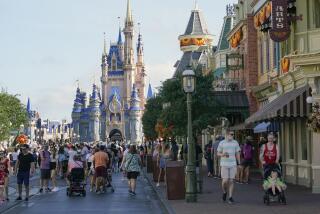Company Town : Some See Disney’s Magic Dimmed With Pullout From Virginia Site
- Share via
WASHINGTON — In abandoning its proposed Virginia site for a bitterly opposed $650-million theme park, Walt Disney Co. scored points on Wall Street and among its critics in the academic and environmental communities, protecting an image as a responsible and savvy company.
But some observers said Thursday that its sudden about-face may have damaged its credibility and demonstrated that it can be whipped, raising questions about its prospects for reviving the project at another location.
But there was unanimity in one respect: The entire crowd of supporters and opponents who had passionately tracked the theme park’s progress was stunned by Disney’s announcement late Wednesday that it was backing down in the face of protest.
Though the critics had been noisy, Disney appeared to have the momentum. Just last week, it won the approval of local zoning and transport officials. It was certain to secure the backing of supervisors in Prince William County, where the park would have been built, about 40 miles west of Washington near two historic Civil War battlefields.
Virginia Gov. George Allen was such a Disney enthusiast that he marshaled support for an unprecedented $163 million in bonds for road improvements the project would have required, not to mention auctioning off his Mickey Mouse tie at a pro-Disney rally.
*
As recently as June, Disney Chairman Michael D. Eisner vowed to Washington Post editors that “if people think we will back off, they are mistaken.”
Disney executives reiterated Thursday that the company will proceed with the ambitious project at a “less controversial” site, preferably in Virginia. Local and state leaders in Virginia and Maryland were scrambling to get to the head of the line.
In its decision, Disney cited the national debate over the park’s location and impending lawsuits that threatened to delay the scheduled opening in 1998. “It has become clear that we could not say when the park would be able to open, or even when we could break ground,” said Peter S. Rummell, president of Disney Design & Development Co.
Opponents had protested that a Disney park would bring air pollution, traffic gridlock, hordes of tourists and ancillary strip malls to the bucolic countryside, desecrating the nearby Civil War battlefields of Manassas and Bull Run.
But Disney’s capitulation deflated the Washington area’s hopes for an economic boon, and business leaders moved quickly Thursday to assure Disney that the company is still welcome.
“It is exasperating that a national constituency was developed to undermine the destiny of this region . . . “ said Charles (Tuck) Nason, chairman of the Greater Washington Board of Trade.
Some Wall Street analysts, however, said they hoped the park will never be built, voicing longstanding doubts in the investment community about the wisdom of the project. Disney shares were unchanged Thursday at $39.875 in a down market.
“I’m real happy that management decided to blow this thing off, and I hope they don’t try it in some other location. I didn’t think they’d make any money out of it,” said David Londoner, managing director of Wertheim Schroder & Co. in New York.
*
The project was becoming a political burden that the image-based company couldn’t afford, said Harold Vogel of Merrill Lynch. “It was burning too much political capital, and I think it was occupying a lot of their management time.”
It wasn’t the first time Disney has changed direction on such projects. Under Eisner, Disney has considered at least three big projects in Southern California that have been scaled back or scrapped: large theme parks in Burbank and Long Beach and a $3-billion expansion of Disneyland.
But in this case, some warned that Disney’s abrupt pullout in the face of the opposition in Virginia will come back to haunt the company.
*
“Disney is going to have to hustle to close this public credibility gap,” said Margaret King, a cultural historian who has worked under contract for Disney. “This is going to cause people to re-examine the way they look at the corporation and its courage in the face of opposition.”
Said Jamie O’Boyle, a historian who has written about Disney’s role in American culture: “Everybody thought it was full-speed ahead. The cultural effects of this for Disney are not good. The message is: Disney can be beaten, even when everything seems to be going full-speed ahead. . . . It will be very difficult for them to develop outside their own property.”
Meanwhile, the anti-Disney crowd in Washington was jubilant, gathering at the National Trust for Historic Preservation in Washington to declare Disney’s decision “responsible and patriotic.”
“We believe that few events in our whole story as a nation better demonstrate the degree to which Americans care about their history than what has happened here,” said noted historian David McCullough, one of the project’s most celebrated opponents.
Outside, a man wore a giant foam head of a sinister-looking Mickey Mouse.
More to Read
Sign up for Essential California
The most important California stories and recommendations in your inbox every morning.
You may occasionally receive promotional content from the Los Angeles Times.













